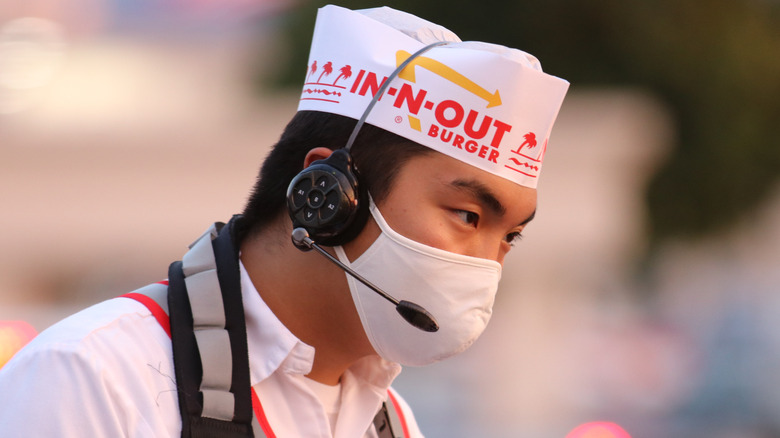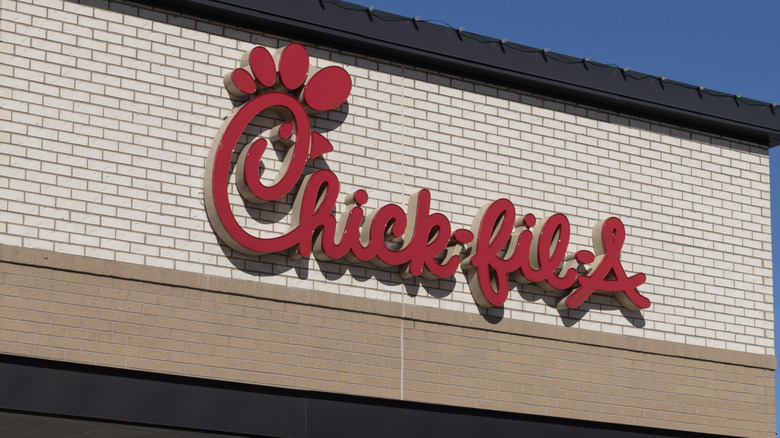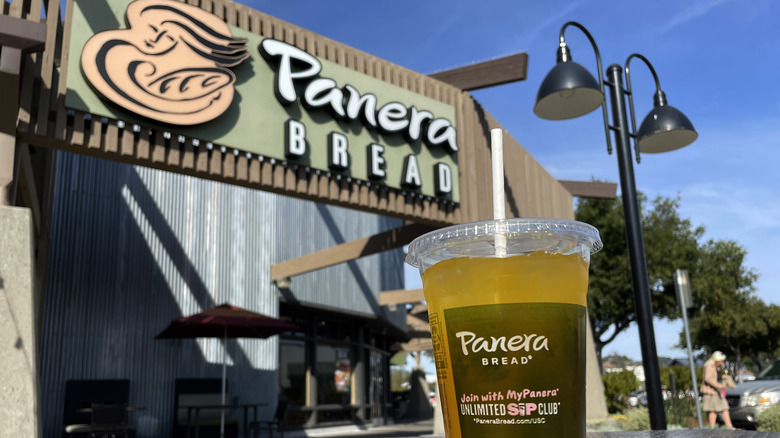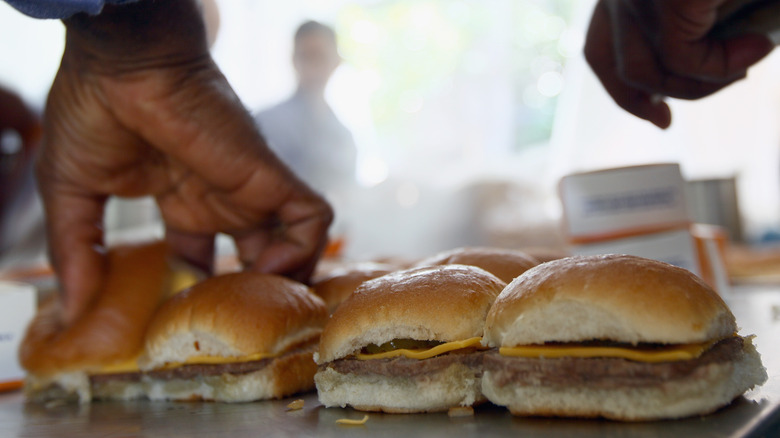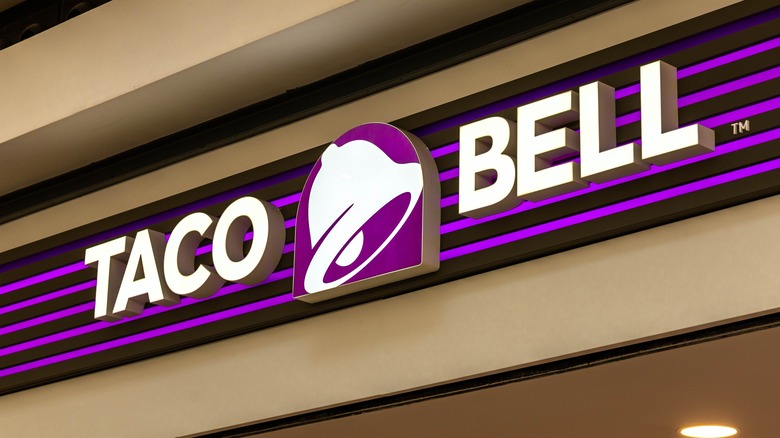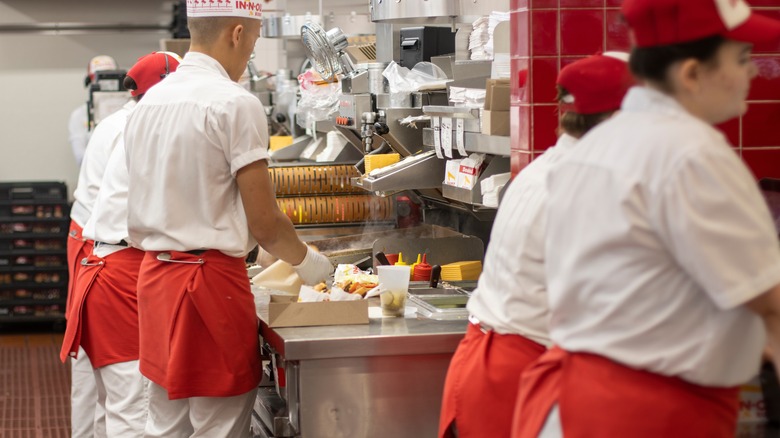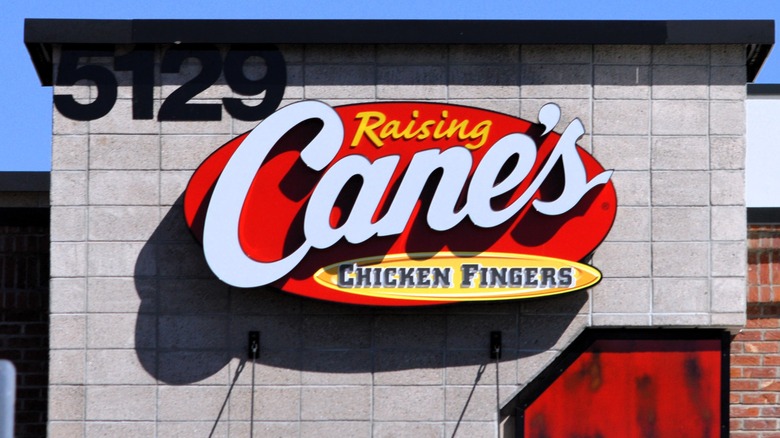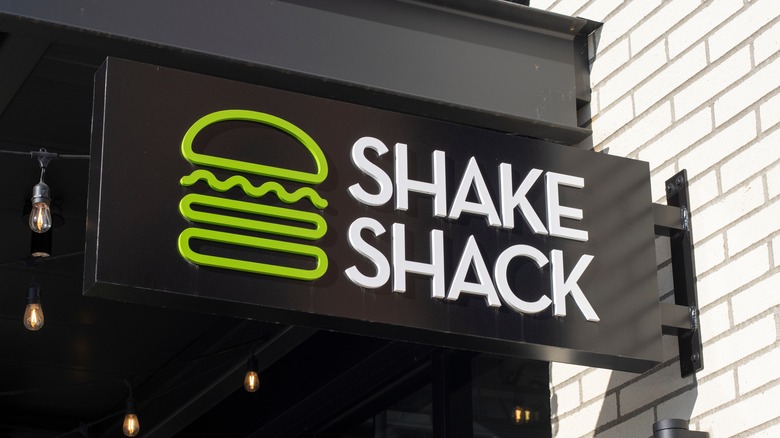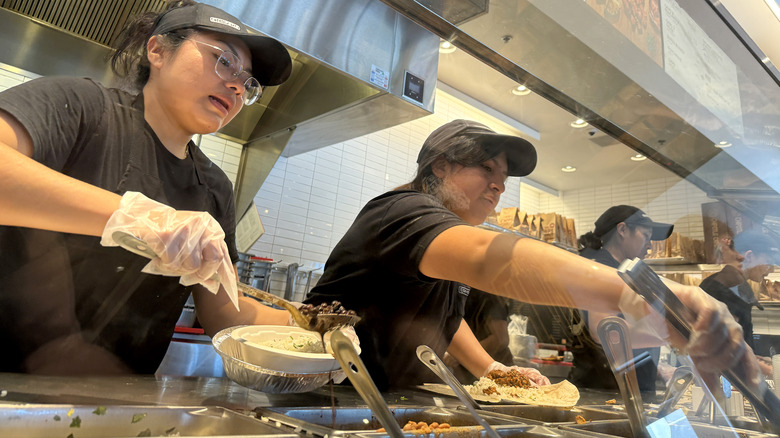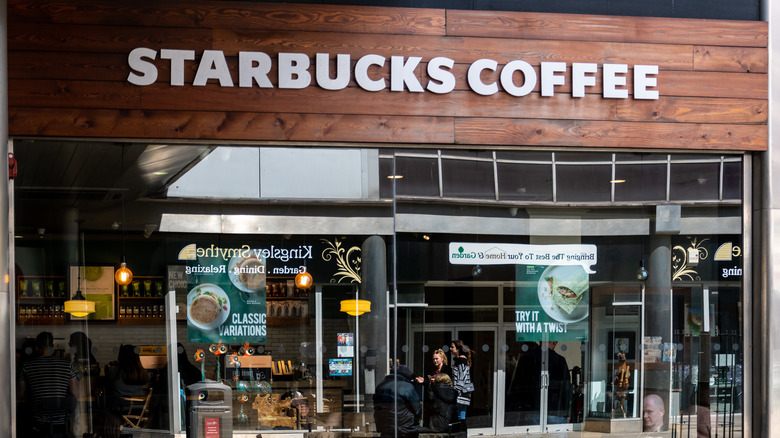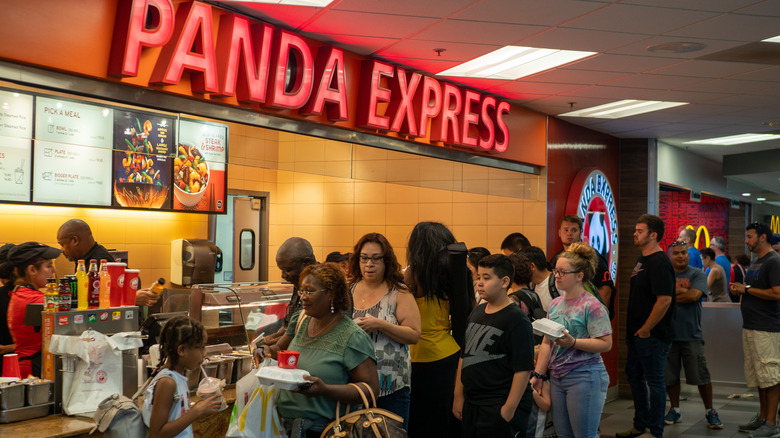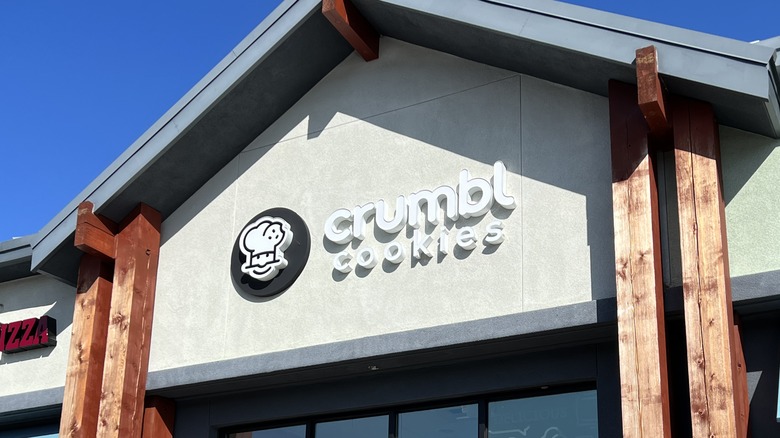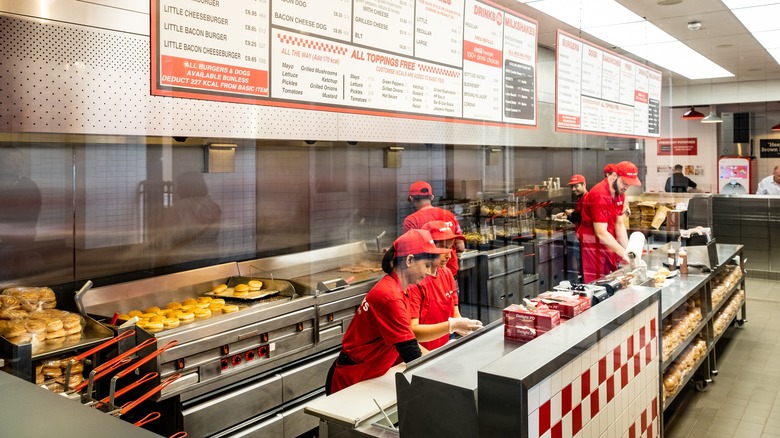The 12 Best Fast Food Chains To Work At
There's a long and deeply held perception that a job in fast food is by its nature rigorous, tedious, and punishing — and without much reward for serving up food safely, accurately, and deliciously. Fast food positions are thought to be low paying, with little to no benefits or opportunity for advancement in terms of position or finances. While quick-serve restaurant work by and large offers smaller salaries than other employment sectors — generally at or near minimum wage in many areas — chains have understood more and more that if they want to recruit and keep a quality workforce, they're going to have to be more generous or competitive with what they pay and what they offer in their benefits packages.
With post-COVID-era labor shortages and inflation both major issues in fast food, many chains are offering decent if not attractive compensation for even entry-level employees needed to staff their counters, drive-through windows, and kitchens. Raising the minimum wage didn't lead to wildly expensive fast food, but it did help improve the fast food labor climate. With salaries, perks, and other worker-bolstering elements of the company culture in mind, here are 12 of the best fast food places to work.
Chick-fil-A
In exchange for preparing, packaging, and serving chicken sandwiches and waffle fries, Chick-fil-A employees are welcome to enjoy one of the most generous 401(k) programs in the restaurant industry. Even rank-and-file counter service and kitchen workers can opt to have a portion of each paycheck paid into a long-term retirement savings-style plan. Chick-fil-A will then match however much the employee socks away, all the way up to 5% of the worker's overall paycheck deduction. This is essentially a 5% salary bonus every pay period.
Another way Chick-fil-A workers can access free money that the company has on offer is through its in-house scholarship system. In 2018, the chain launched the Remarkable Futures program. With an initial endowment of $14.5 million, that money gets paid out in scholarships worth $2,500 or $25,000, and are good at accredited universities, junior colleges, online degree programs, or vocational schools. These scholarships are open to any and all Chick-fil-A employees, regardless of how long they've worked for the restaurant or if they're part-time or full-time workers. And all that comes on top of an average starting base salary of $13.55 an hour for restaurant workers, which far exceeds the federal hourly minimum wage of $7.25.
Panera Bread
Even as Panera Bread might be lowering standards to cut costs, the majority of people who work for, or have worked for, the sandwich, soup, and coffee giant, have provided positive reviews on job site Indeed. More than 11,000 Panera Bread folks gave the employer a five- or four-star rating (on a five-star scale), and getting especially high marks are factors like company culture and a commitment to work-life balance. It's also one of the best-paying chains in all of fast food, with an opening restaurant-level hourly wage of $15.50 to $18. The chain helps pay for a multi-tiered system of insurance, too, offering different grades of medical coverage along with vision and dental.
Beyond the elevated pay system, and plentiful, gratis team trips and employee events, Panera Bread contributes to its employees' financial health with a 401(k) plan. The company matches withholdings, too — workers can contribute as much as 6% to their retirement account with Panera fully equaling it. Another long-term financial planning measure: Employees can buy stock in Panera Bread at a discount of 15% off the ticker price.
In 2023, restaurant industry research firm Black Box Intelligence recognized Panera with an Employer of Choice award. That honor is given to restaurant chains that experience the least amount of employee and management turnover while also demonstrating a diversity of gender, race, and ethnicity in its workforce.
White Castle
One of the oldest continuously operating fast food chains in the United States and the restaurant that popularized hole-laden, onion-flavored, miniature burgers called sliders, White Castle is the most American fast food, and an institution unto itself. It's also one of the most highly-rated restaurants in the country, as far as the workers are concerned. In both 2022 and 2023, White Castle appeared on Fortune Magazine's list of Best Workplaces in Retail. Ranking no. 18 and no. 22 in successive years, White Castle is the only fast food company to make either list. In the more recent survey, 81% of White Castle employees called the burger factories "a great place to work," much higher than the 57% average employer score.
Employees cite a commitment from corporate and management to a healthy work culture. More than 80% say the company always provides the right equipment and materials, that they feel valued, and that they feel heard by superiors. And all that comes with maintaining an hourly wage slightly more than normal, at $15.
Taco Bell
People are turning to Taco Bell to save money, while employees earn about $12 to $15 an hour, which is only just slightly above the current fast food average. But Taco Bell still earns recommendations from a majority of current and past employees, perhaps because of its novel benefits, which features perks not widely matched by the Mexican-inspired chain's competitors.
Workers get a certain level of autonomy over their time on the clock, with readily flexible schedules, and on Fridays they can choose to work a half shift. That's in addition to up to four weeks of vacation time, sick leave, and 10 paid holidays, and if employees want to volunteer with a charitable endeavor, Taco Bell will pay full salary for up to two days of work missed. Health care packages, with medical, dental, and vision included, start immediately upon hiring, with no trial or waiting period of employment. The life insurance offered by the company comes for free, and Taco Bell also offers tuition reimbursement, 6% matching on 401(k) retirement plans, adoption funds assistance, and 18 weeks of paid leave for new parents. Restaurant-level employees enrolled in a two-year or four-year college or trade school are eligible for a piece of the $2 million awarded each year through the Taco Bell Foundation's Live Mas Scholarship Program.
Flynn is the largest restaurant franchisee in the United States, and it runs 280 Taco Bells. Those offer instant pay — employees can access their wages immediately after their shift ends.
In-N-Out
In 2024, job search and labor research service Glassdoor published its "Best Places to Work" rankings. Amidst numerous tech and financial firms sat California-based burger chain In-N-Out. Based on reviews by actual employees, In-N-Out was named the sixth-best place to work in the Unites States; no other restaurant of any kind made that list.
An In-N-Out restaurant is an efficient, perpetually busy endeavor, and it takes large teams of "Associates" to keep everything running smoothly. They're paid handsomely for their labor and commitment, $14 to $22 per hour, well above the fast food hourly average of $11.11. Fringe benefits are offered to part-time and full-time Associates, with the latter enjoying more prestigious rewards for their service. Both tiers get dental, vision, and access to an Associate Assistance Program, profit sharing, and a 401(k) . Full timers get medical, business and travel insurance, and start building paid-time off (vacation and sick days) based on how long they've been there, from two weeks after one year (and up to five years), all the way up to four weeks for 11 or more years with the company.
Raising Cane's
Raising Cane's CEO Todd Graves is one of the richest people on Earth, while the thousands of hourly-waged employees who run the chain's individual restaurants, serving up chicken fingers to the masses, earn a bit more than minimum wage. Starting pay at the chain sits in the $13 to $16 range, which is offset and boosted by financial benefits both through the company and indirectly.
Raising Cane's Crewmembers, paid by the hour but with wages dispensed weekly (as opposed to the standard of every other week) can opt to enroll in several company-subsidized insurance programs. The medical plan includes a pharmacy benefit, and Raising Cane's also helps out with life insurance, pet health insurance, and legal insurance. Workers can access renter's insurance and car insurance as well as enter into an ID theft protection program. Raising Cane's offers a 401(k) retirement savings plan, and will match contributions anywhere between 3-6% of what the employee pays in. Crewmembers can even sign up for cost-reduced cell phone plans via a partnership with Verizon.
Workers also get paid time off along with significant holidays off, because Raising Cane's just isn't open on those days. And if employees don't have a high school diploma, Raising Cane's will foot the entire bill for the equivalency process.
Shake Shack
Danny Meyer, the restaurateur behind acclaimed high-end New York City eateries like the Union Square Café and the Gramercy Tavern, launched Shake Shack in the early 2000s, now a chain of more than 320 American locations. Usually, fast food restaurants and for-profit businesses are squarely focused on customers; Meyer embedded an employees-first mission into Shake Shack's DNA. "I've learned how crucially important it is to put hospitality to work, first for the people who work for me and subsequently for all the other people and stakeholders who are in any way affected by our business," he wrote in Setting the Table.
Meyer believes that success will come for Shake Shack with happy, well-treated employees. He banned smoking in restaurants before it was required by law, and increased the pay at his restaurants to well over minimum wage levels, opting to provide a higher standard wage rather than rely on tipping, which left out kitchen staff. Shake Shack brass wants restaurant employees to view their labor as a career, not a job, and as such, generous benefits are on offer. All employees can opt into medical, dental, and vision insurance plans, they get invited to whole-company retreats, and they may take paid time off and parental leave if necessary. Time off goes up the longer an employee works at Shake Shack, as does their pay rate.
Chipotle
Struggling to attract and meaningfully retain employees in 2015, Chipotle revamped its benefits package. Previously, benefits were available to salaried and corporate employees, but ever since, the perks are offered to the paid-by-the-hour employees cooking chicken and assembling burritos.
Because Chipotle prefers and tends to recruit from its base of employees who understand company culture to fill higher positions, it offers full tuition reimbursement so its workers can be better educated and prepared. The chain also matches employees' student loan payments by contributing the same monthly amount to the worker's 401(k) retirement savings plan. Another source of free money: December bonuses for employees with the company for a year or more. Such tenured workers are also able to buy Chipotle stock at a lower cost, and through payroll deductions. Medical benefits are offered via a prevention-centered health care plan that includes a telemedicine program and generous PPO-style programs for dental and vision.
Starbucks
Store-level Starbucks employees do a little bit of everything around the cafés, but they're all classified as Baristas. As of 2024, the starting salary for those increasingly unionized and protected workers is a higher than average $15.41 an hour, plus a lot more in tips, pooled among each store's staff. Other Starbucks perks are myriad. If employees make charitable donations to a select group of nonprofits with whom Starbucks has a relationship, the company will equal those donations at a rate of up to $1,000 a year. The chain's tuition program is an especially popular benefit, with about 90% of American outlets employing at least one student utilizing the perk. The company will pay for its workers to get one of more than 140 Bachelor's degrees via its partnership with Arizona State University's online division.
And not only do Starbucks employees get a free pound of coffee beans or an assortment of tea each week of their employment, they get 30% off Starbucks food and merchandise, discounts from various other stores, and a free subscription to ad-free Spotify. Like many other large employers, Starbucks offers medical insurance plans to its workforce — and a variety of them — and also dental and vision coverage. The coffee chain also provides comprehensive mental health, paying for 20 therapy sessions annually and subscriptions to an app-based medication service. Starbucks will help baristas pay for adoption and surrogacy services and fertility treatments, and then paid leave for new parents of biological or adopted children.
Panda Express
Serving up Panda Express's Chinese-inspired dishes that can compare to "real" Chinese takeout makes for a quite pleasant work environment. According to Fortune's "Great Place to Work" project, 85% of employees say Panda Express is an exemplary employer. Its sales figures and number of locations have substantially increased in the 2020s, and CFO David Landsberg says that growth is due in part to the company's commitment to employee relations. "What's been very effective in our recruiting efforts is communicating our earning potential and career growth opportunities," Landsberg told Nation's Restaurant News about its "people-first" plan, which allowed Panda Express to avoid the staffing issues experienced throughout the fast food industry.
One of the benefits of working at the Chinese-American cafeteria-style chain is that food prep employees can easily and quickly get on a management track and earn a six-figure income. More than two-thirds of managers and all of its executives joined the company as hourly workers. Even at that level, the pay and perks are noticeable. New employees earn an average of $18.26 an hour, more than double the national minimum wage. Factoring in regular salary, bonuses, and the worth of benefits, Panda Express employees can pull in well over $40,000 annually right away.
Crumbl Cookies
With nearly 1,000 locations in the United States and annual sales of $1 billion, Crumbl Cookies has grown very quickly since its founding in Utah in 2017. Labor is part of the equation of success for the chain that sells an ever-changing lineup of big cookies, as 71% of employees surveyed named Crumbl a "great place to work for" to Fortune.
The average beginning wage for Crumbl crew members is $13.82, high above the federal hourly minimum wage of $7.25. Company cultural values like work-life balance, overall employee health, and outreach inform Crumbl's benefits packages. Full-time cookie makers and sellers get 15 days of annual vacation days in addition to paid holidays, two community service volunteer work days, and bonus days off during the summer. Employees might use some of their days off to use the $500 the company provides to offset personal travel expenses. Workers only have to have served with Crumbl for six months before they're eligible for 12 weeks of parental leave, and many full-timers qualify for health insurance for which the company covers 80% of monthly premium costs for the employee and 60% for the worker's family members.
Five Guys
Cooking thick burgers, funneling mountains of fries into paper bags, and mixing up milkshakes at Five Guys is a decent way to earn a living, say workers who have done just that. According to Fortune's "Great Place to Work" program, 83% of employees have had a positive working experience. The payment structure must have something to do with that high level of satisfaction. In 2024, Five Guys paid its restaurant workers a standard basic salary of $12.85 per hour, but there exist chances for ample bonuses. The average Five Guys employee may take home as much as $4,000 each year in extra payments, obtained through channels that include passing inspections.
Five Guys extends an education benefit to its contingent of burger flippers and fry cooks. About 100 online programs from various institutions are covered, including undergraduate degrees, professional certificates, and high school equivalency. In many of these continuing education programs, Five Guys will cover all expenses, as much as $5,250 annually per employee.
